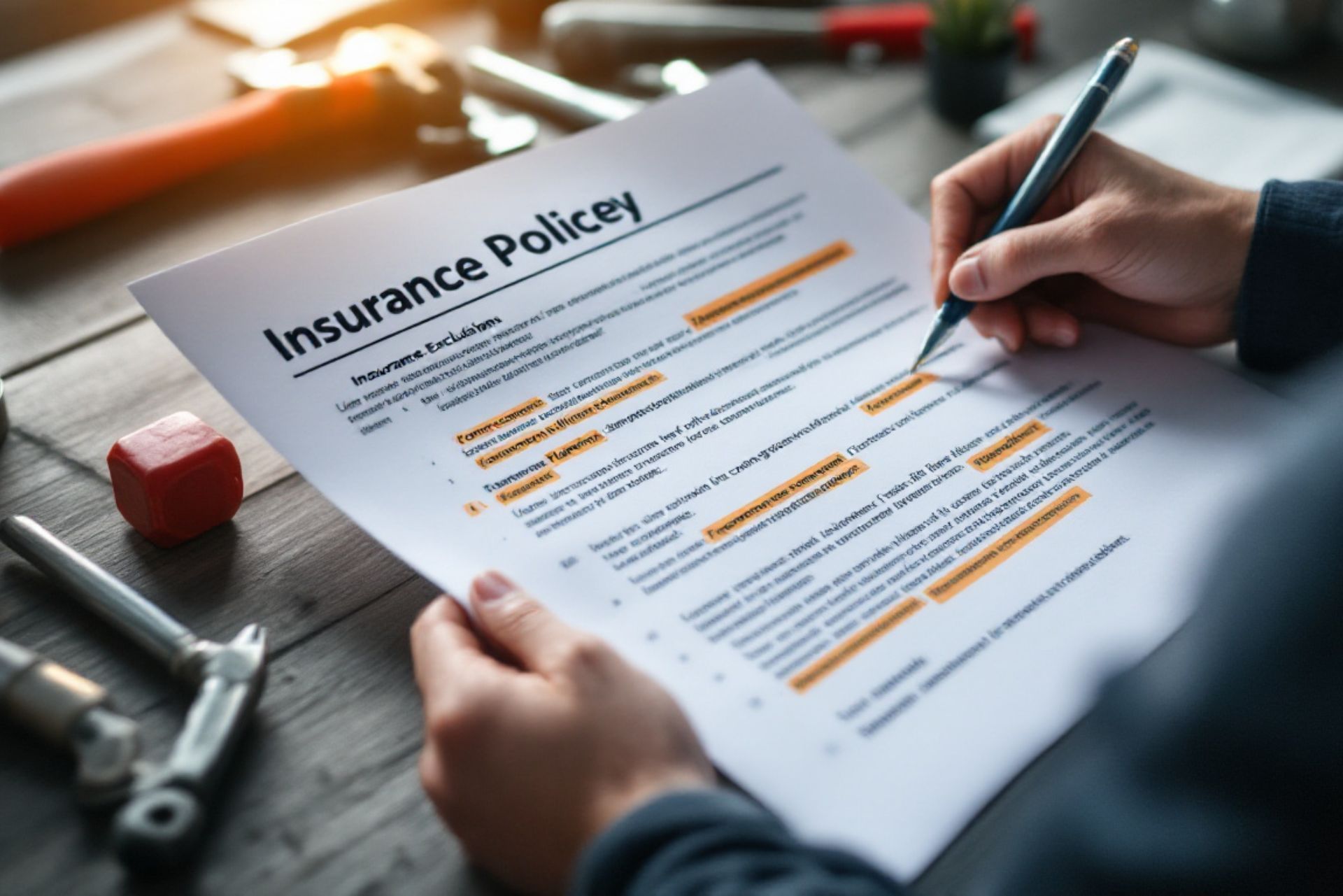Index
Contact Us
Phone
Location
Simi Valley, CA 93065
The Woodlands, TX 77382
Katy, TX 77494
As a plumber specializing in new construction, you face unique challenges and risks that require robust insurance coverage. Understanding the ins and outs of plumber insurance is essential for protecting your business, your employees, and your clients. This comprehensive guide will walk you through everything you need to know about new construction plumber insurance, including types of coverage, the importance of insurance, and tips for choosing the right policy.
Understanding Plumber Insurance
Before diving into the specifics of new construction plumber insurance, it’s crucial to grasp what plumber insurance entails. Plumber insurance is designed to protect plumbing contractors from various risks associated with their work, including property damage, bodily injury, and legal claims. This specialized insurance not only safeguards the financial health of the business but also provides peace of mind to contractors who face the unpredictable nature of their trade.
Types of Insurance Coverage
There are several types of insurance coverage that a plumber should consider. Each type serves a different purpose and can protect you from various liabilities. Understanding these coverages can help you tailor your insurance portfolio to meet the specific needs of your plumbing business.
- General Liability Insurance: This is the most fundamental type of insurance for plumbers. It covers bodily injury and property damage that may occur during your work. For instance, if a client trips over your tools and gets injured, this insurance can help cover medical expenses. General liability insurance also protects against claims of slander or libel, which can be particularly important in a service-oriented industry where reputation is everything.
- Workers' Compensation Insurance: If you have employees, workers' compensation is not just a good idea; it’s often required by law. This insurance covers medical expenses and lost wages for employees who are injured on the job. Additionally, it can help cover rehabilitation costs, ensuring that your workers receive the care they need to return to work safely.
- Commercial Auto Insurance: If you use vehicles for your plumbing business, commercial auto insurance is essential. It protects your vehicles and covers liability in case of accidents. This type of insurance is particularly important for plumbers who travel frequently to job sites, as it can also provide coverage for tools and equipment stored in the vehicle.
- Professional Liability Insurance: Also known as errors and omissions insurance, this covers claims related to negligence or mistakes in your professional services. This is particularly relevant for plumbers who offer design services or consultations, as it protects against claims that may arise from perceived inadequacies in your work.
Why Insurance is Essential for Plumbers
Insurance is not just a legal requirement; it’s a critical component of risk management for plumbers. Here are some reasons why having adequate insurance coverage is essential:
- Financial Protection: Accidents happen, and without insurance, you could be liable for significant costs that could jeopardize your business. The financial implications of a single lawsuit or a severe accident can be devastating, potentially leading to bankruptcy if you are not adequately insured.
- Client Trust: Having insurance can enhance your credibility with clients. It shows that you are responsible and prepared for any eventualities. Clients are more likely to hire a plumber who can demonstrate that they have the necessary insurance coverage, as it reflects professionalism and a commitment to quality service.
- Legal Compliance: Many states require certain types of insurance for contractors. Being compliant helps you avoid legal issues. Moreover, maintaining the right insurance can also be a deciding factor in winning contracts, especially in competitive bidding situations where clients prioritize safety and reliability.
Moreover, understanding the nuances of plumber insurance can also help you identify potential gaps in your coverage. For instance, seasonal fluctuations in work volume may necessitate temporary adjustments to your insurance policies. Additionally, as your business grows and evolves, so too should your insurance coverage to adequately reflect new risks and responsibilities. Regularly reviewing your insurance policies with a knowledgeable agent can ensure that you remain protected and compliant as your plumbing business expands.

Specific Risks in New Construction Plumbing
New construction plumbing involves specific risks that can differ significantly from residential or commercial plumbing repairs. Understanding these risks is vital for selecting the right insurance coverage.
Common Hazards
In the realm of new construction, plumbers face various hazards that can lead to accidents or damage. These include:
- Site Conditions: Construction sites can be chaotic, with heavy machinery, uneven surfaces, and other hazards that increase the risk of accidents.
- Material Handling: Plumbers often work with heavy materials such as pipes and fixtures. Improper handling can lead to injuries or property damage.
- Coordination with Other Trades: New construction involves multiple contractors working simultaneously. Miscommunication can lead to accidents or costly mistakes.
Additionally, the presence of hazardous materials, such as asbestos or lead, can pose significant health risks to plumbers. These materials may be encountered during renovations or in older buildings being repurposed for new construction. Proper training and safety protocols are essential to mitigate these risks, as exposure can lead to serious long-term health issues. Furthermore, the fluctuating weather conditions on construction sites can also impact safety; rain or snow can create slippery surfaces, while extreme heat can lead to heat-related illnesses among workers.
Liability Risks
Liability risks are particularly pronounced in new construction plumbing. Here are some examples:
- Property Damage: If a plumbing installation causes water damage to a newly built structure, you could be held liable for repairs.
- Injury Claims: If a worker or bystander is injured due to plumbing work, you may face legal claims that can be financially devastating.
Moreover, the complexity of modern plumbing systems adds another layer of liability. With the integration of advanced technologies such as smart plumbing systems, any malfunction can result in significant damages or injuries. Plumbers must stay updated on the latest building codes and regulations, as non-compliance can lead to legal repercussions and increased insurance costs. Additionally, the potential for disputes over warranty claims can arise if plumbing systems fail shortly after installation, further complicating liability issues and necessitating thorough documentation and communication with clients and contractors.
Choosing the Right Insurance Policy
With various types of insurance available, selecting the right policy can be overwhelming. Here are some tips to help you make an informed decision.
Assess Your Needs
Before shopping for insurance, assess your specific needs based on the scope of your work. Consider factors such as:
- The size of your business
- The number of employees
- The types of projects you typically undertake
Additionally, think about the potential risks associated with your industry. For instance, if you operate in a field that involves heavy machinery or hazardous materials, you may require specialized coverage to protect against accidents or liabilities. It's also wise to evaluate your past insurance claims and any gaps in coverage that may have left you vulnerable. This thorough analysis will provide a clearer picture of what you truly need from an insurance policy.
Shop Around for Quotes
Don’t settle for the first insurance quote you receive. Shop around and compare policies from different providers. Pay attention to:
- Coverage limits
- Exclusions
- Premium costs
While comparing quotes, consider not just the price but also the reputation of the insurance company. Look for customer reviews and ratings, as well as their claims processing efficiency. A lower premium might be tempting, but if the insurer has a history of poor customer service or delayed claims, it could lead to frustration down the line. Furthermore, inquire about any available discounts for bundling policies or maintaining a claims-free record, as these can significantly reduce your overall costs.
Consult with an Insurance Agent
Working with an experienced insurance agent can simplify the process. They can help you understand the nuances of different policies and guide you toward the best coverage for your needs.
Moreover, a knowledgeable agent can provide insights into industry trends and emerging risks that may affect your business in the future. They can also assist in tailoring your policy to include endorsements or riders that enhance your coverage, ensuring that you are not only compliant with legal requirements but also adequately protected against unforeseen circumstances. This personalized approach can make a significant difference in your overall insurance experience, allowing you to focus on what you do best—running your business.
Cost of New Construction Plumber Insurance
The cost of plumber insurance can vary widely based on several factors. Understanding these factors can help you budget appropriately.
Factors Influencing Insurance Costs
Several factors can affect the cost of your insurance premiums, including:
- Business Size: Larger businesses with more employees typically face higher premiums due to increased risk.
- Claims History: If you have a history of claims, insurers may view you as a higher risk, leading to increased premiums.
- Location: The area where you operate can also influence costs. Urban areas may have higher rates due to increased liability risks.
Average Premium Costs
While costs can vary, here are some average premium ranges for plumber insurance:
- General Liability Insurance: $400 to $1,500 per year
- Workers' Compensation Insurance: $0.75 to $2.00 per $100 of payroll
- Commercial Auto Insurance: $1,200 to $2,500 per year
Ways to Lower Your Premiums
There are several strategies you can employ to lower your insurance premiums:
- Bundle Policies: Many insurance companies offer discounts for bundling multiple policies.
- Improve Safety Practices: Implementing safety training and protocols can reduce the likelihood of accidents, which may lead to lower premiums.
- Maintain a Clean Claims Record: Avoiding claims can help you secure better rates over time.
Understanding the Importance of Insurance
Having the right insurance coverage is not just a regulatory requirement; it is also a crucial aspect of protecting your business assets. For plumbers, who often work in unpredictable environments, insurance serves as a safety net against various risks. For instance, accidents can happen on the job site, leading to potential injuries or property damage. Without adequate insurance, the financial burden of these incidents can be overwhelming, potentially jeopardizing the future of your business.
Choosing the Right Insurance Provider
When selecting an insurance provider, it's essential to do thorough research to find a company that understands the specific needs of plumbing businesses. Look for insurers that specialize in construction or trades, as they will be more familiar with the unique risks associated with plumbing work. Additionally, consider the level of customer service and support they offer, as having a responsive insurer can make a significant difference when you need to file a claim or seek advice on your coverage options.

Common Exclusions in Plumber Insurance
When reviewing your insurance policy, it’s essential to understand what is not covered. Common exclusions can leave you vulnerable if you’re not aware of them.
Typical Exclusions
Some common exclusions in plumber insurance policies include:
- Intentional Damage: Any damage caused intentionally or through gross negligence is typically not covered.
- Wear and Tear: Routine maintenance issues or wear and tear are usually excluded from coverage.
- Contractual Liabilities: If you assume liability through a contract, it may not be covered by your insurance.
Understanding Your Policy
It’s crucial to read your policy thoroughly and ask your insurance agent about any exclusions you don’t understand. This knowledge will help you avoid surprises when you need to file a claim.
In addition to the exclusions mentioned, many policies may also exclude coverage for specific types of work or materials. For instance, if you are working with hazardous materials or undertaking high-risk projects, these may not be covered under standard plumber insurance. It’s important to disclose all aspects of your work to your insurer to ensure you have adequate coverage for the unique risks you face in your profession.
Furthermore, understanding the limits of your coverage is just as important as knowing the exclusions. Each policy will have a limit on how much it will pay out for certain claims, and exceeding this limit can leave you financially responsible for the remaining costs. Be sure to discuss these limits with your insurance agent and consider whether you need to adjust your coverage based on the scale and scope of your plumbing operations.
Filing a Claim: What to Expect
When an incident occurs, knowing how to file a claim can save you time and stress. Here’s a step-by-step guide to help you through the process.
Step-by-Step Claim Process
Filing a claim generally involves the following steps:
- Notify Your Insurer: As soon as an incident occurs, contact your insurance provider to report the claim.
- Document the Incident: Gather evidence, including photos, witness statements, and any relevant documentation.
- Complete Claim Forms: Fill out the necessary claim forms provided by your insurer.
- Follow Up: Stay in touch with your insurer to track the progress of your claim.
Tips for a Successful Claim
To ensure your claim is processed smoothly, consider the following tips:
- Be Honest: Provide accurate information to avoid complications.
- Keep Records: Maintain a detailed record of all communications with your insurer.
- Be Patient: Claims can take time to process, so be prepared for a wait.
In addition to these basic steps and tips, it’s also essential to understand the specific terms and conditions of your insurance policy. Different policies may have varying requirements for filing claims, including deadlines for reporting incidents or specific documentation that must be submitted. Familiarizing yourself with these details can prevent unnecessary delays and ensure that you are fully prepared when the time comes to file a claim.
Moreover, consider reaching out to your insurance agent for personalized guidance. They can provide insights tailored to your unique situation and help clarify any confusing aspects of the claims process. Having a knowledgeable advocate on your side can make a significant difference, especially if your claim encounters any challenges along the way. Remember, being proactive and informed can empower you throughout this often complex and daunting experience.
Conclusion
New construction plumber insurance is a vital aspect of running a successful plumbing business. By understanding the types of coverage available, assessing your risks, and choosing the right policy, you can protect your business from unforeseen challenges. Remember, investing in the right insurance not only safeguards your financial future but also enhances your credibility with clients. Take the time to educate yourself about your options, and don’t hesitate to consult with professionals to ensure you have the best coverage for your needs.
By being proactive about your insurance needs, you can focus on what you do best—providing quality plumbing services in the exciting world of new construction.
Types of Plumber Insurance We Provide
Areas we serve




